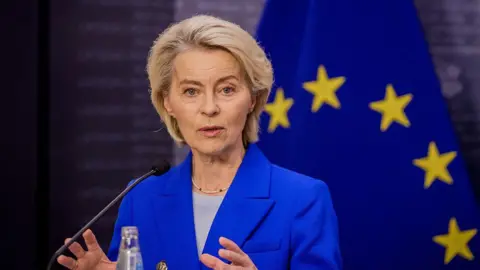European Commission President Ursula von der Leyen has successfully survived a rare confidence vote in the European Parliament, initiated by far-right MEP Gheorghe Piperea. While the outcome — 360 votes against, 175 in favor, and 18 abstentions — was expected, the very occurrence of the vote signals mounting tensions regarding her leadership, just a year into her second term as Commission chief.
Confidence votes like this are uncommon in the EU, with the last instance occurring over a decade ago against former president Jean-Claude Juncker. To pass, the motion would have required the backing of two-thirds of the 720 Members of the European Parliament (MEPs), emphasizing the uphill battle faced by Piperea and his allies.
The far-right criticism centered around allegations of a lack of transparency tied to von der Leyen’s communication with Pfizer during the COVID-19 vaccine negotiations. Piperea's motion claimed that the Commission could no longer be relied upon to uphold democratic ideals such as transparency and accountability. In response, von der Leyen vehemently accused her accusers of being "conspiracy theorists" and defended her actions, labeling the claims about her dealings as "simply a lie."
Support for the motion emerged primarily from the far-right factions including Patriots for Europe (PfE) and European of Sovereign Nations (ENS), garnering some attention from Hungarian Prime Minister Viktor Orban, who publicly backed Piperea's call for von der Leyen to step down. Yet, the internal structure of the European Conservatives and Reformists (ECR) group appeared divided, as many members, particularly from Giorgia Meloni's Brothers of Italy party, voted against the motion, highlighting a complex relationship between von der Leyen and some far-right parties.
Ultimately, von der Leyen secured her position with the support of various political groupings including her own centre-right European People’s Party (EPP), Socialist & Democrats (S&D), and leftist factions. Nonetheless, several of these groups expressed dissatisfaction, particularly regarding her recent collaborations with the far-right on policies around migration and environmental issues. Renew Europe's Valérie Hayer warned that support for von der Leyen was not guaranteed if she continued to align with the far-right.
Critics within the S&D emphasized the irresponsible nature of deconstructing the Commission in the face of current geopolitical challenges, reiterating their support came with significant caveats. Just before the vote, speculations arose about abstaining, but the S&D ultimately decided to back von der Leyen after she committed to maintaining funding for social programs in the upcoming budget.
With the confidence vote concluded, von der Leyen delivered remarks at the Ukraine Recovery Conference in Rome, reinforcing her commitment to European values amid depicted external pressures aimed at destabilizing the Union. Following the vote, she expressed gratitude for the support, asserting that unity is essential during these challenging times.




















